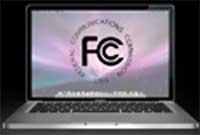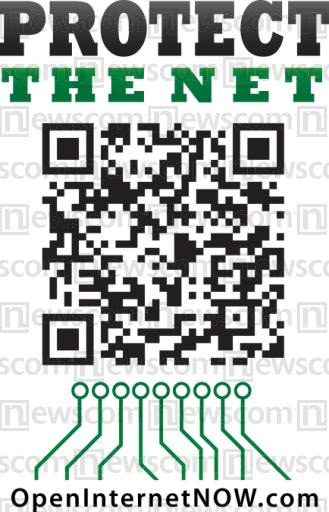The Federal Communications Commission has released its new net neutrality rules after announcing them two weeks ago. The rules followed a call from President Obama in November to reclassify Internet service under Title II of the Telecommunications Act, which would make it a utility. The new rules call for broadband to be considered a telecommunications service, and providers are to be regulated.
This prompted a wide array of responses from various parties of interest, including a press release written in morse code from Verizon.

The new release caused the FCC site to crash, and as of the time of this writing, it’s displaying a message that says:
The normal FCC website is temporarily unavailable due to technical difficulties. We are working to restore the full FCC website back to normal as soon as possible.
Te PDF, however, is viewable here (via Re/code):
The site seems to be going on and off, so if you keep trying, you might be able to bring it up.
Since the release of the document, a policy summary of FCC Commissioner Ajit Pai’s “statement dissenting from the FCC’s decision to adopt President Obama’s plan to regulate the Internet” has been released. Here’s what it says:
For twenty years, there’s been a bipartisan consensus in favor of a free and open Internet—one unfettered by government regulation. So why is the FCC turning its back on Internet freedom? It is flip-flopping for one reason and one reason alone. President Obama told it to do so.
The Commission’s decision to adopt President Obama’s plan marks a monumental shift toward government control of the Internet. It gives the FCC the power to micromanage virtually every aspect of how the Internet works. It’s an overreach that will let a Washington bureaucracy, and not the American people, decide the future of the online world.
One facet of that control is rate regulation. For the first time, the FCC will regulate the rates that Internet service providers may charge and will set a price of zero for certain commercial agreements.
The Commission can also outlaw pro-consumer service plans.If you like your current service plan, you should be able to keep your current service plan. The FCC shouldn’t take it away from you.
Consumers should expect their broadband bills to go up. The plan explicitly opens the door to billions of dollars in new taxes on broadband. One estimate puts the total at $11 billion a year.
Consumers’ broadband speeds will be slower. Compare the broadband market in the U.S. to that in Europe, where broadband is generally regulated as a public utility. Today, 82% of Americans have access to 25 Mbps broadband speeds. Only 54% of Europeans do. Moreover, in the U.S., average mobile speeds are 30% faster than they are in Western Europe.
This plan will reduce competition and drive smaller broadband providers out of business. That’s why the plan is opposed by the country’s smallest private competitors and many municipal broadband providers. Monopoly rules from a monopoly era will move us toward a monopoly.
The Internet is not broken. We do not need President Obama’s plan to “fix it.”
The plan in front of us today was not formulated at the FCC through a transparent notice-and-comment rulemaking process. As The Wall Street Journal reports, it was developed through “an unusual, secretive effort inside the White House.” Indeed, White House officials, according to the Journal, functioned as a “parallel version of the FCC.” Their work led to the President’s announcement in November of his plan for Internet regulation, a plan which “blindsided” the FCC and “swept aside . . . months of work by [Chairman] Wheeler toward a compromise.”
The plan has glaring legal flaws that are sure to keep the Commission mired in litigation for a long, long time.
A legal summary of Pai’s statement has also been released. Here’s what that one says:
In adopting President Obama’s plan to regulate the Internet, the FCC violated the procedural requirements of the Administrative Procedure Act (APA).
The FCC never proposed the rules being adopted, violating the APA’s notice-and-comment requirement. In last year’s Notice, the FCC proposed rules under section 706 of the Telecommunications Act. Every single proposal and every single tentative conclusion in last year’s Notice was tailored to avoid reclassifying broadband as a Title II service. Yet that’s exactly what the FCC does in this Order.
No one could have anticipated the number or nature of the hoops the Order would jump through to reclassify broadband. Nor could anyone have anticipated the Order’s 49 separate forbearance decisions; its decision to subject interconnection to Title II as a “component” of broadband Internet access service; its decision to amend agency rules regarding mobile broadband; or its adoption of an omnivorous “Internet conduct” standard, the scope of which remains uncertain.
The FCC cannot rely on President Obama’s YouTube directive to the agency cure these deficiencies. The President’s video was not approved by FCC commissioners, published in the Federal Register, or subject to public comment.
President Obama’s plan to regulate the Internet also violates the Communications Act.
Neither the text of the Act nor FCC precedent allows the agency to reclassify broadband Internet access service as a Title II telecommunications service. In 1996, President Clinton and Congress decided that “any” service that “provides access to the Internet” would be an information service. In turn, the FCC has never classified an Internet Service Provider as a telecommunications carrier. Instead, the FCC has determined each and every time since the Clinton Administration’s Stevens Report that Internet access always involves more than meretransmission—and thus is an information service.
Section 332 of the Communications Act independently bars the FCC from reclassifying mobile broadband Internet access service as a Title II telecommunications service.
The text, structure, and Congressional intent all make clear that section 706 of the Telecommunications Act does not give the FCC any independent authority.
The Order invents an entirely new method of forbearance analysis that doesn’t adhere to the forbearance criteria in the Act or the FCC’s precedents.
Pai appeared on Fox business to talk about this more:
The FCC has also released a dissenting statement from Commissioner Michael O’Reilly. HIs is seventeen pages long, so I’ll direct you to his tweets, which include a link.
What’s unprecedented and highly objectionable is @FCC takeover of the Internet! @kwerb @ampressman @AjitPaiFCC
— Mike O’Rielly (@mikeofcc) March 12, 2015
Specific NN rules 8 pgs but doesn’t reflect massive authority to @FCC staff for TBD decisions & enforcement. @kwerb @ampressman @AjitPaiFCC
— Mike O’Rielly (@mikeofcc) March 12, 2015
For those interested, @FCC released Net Neutrality item, which includes my dissent. Available on website or https://t.co/lr7lAkDH42.
— Mike O’Rielly (@mikeofcc) March 12, 2015
Here is a link to my dissent to @FCC Net Neutrality item. It complements the verbal one I gave at the Open Meeting. http://t.co/TV8f2cXw4t
— Mike O’Rielly (@mikeofcc) March 12, 2015
Some words from FCC Chairman Tom Wheeler:
Historic day here at the @FCC. Finally adopted strong, sustainable, enforceable rules to protect #OpenInternet. Thanks for your support.
— Tom Wheeler (@TomWheelerFCC) February 26, 2015
The #OpenInternet rules released today restore & strengthen protections for consumers & innovators online. http://t.co/tWpeGaPY7q
— Tom Wheeler (@TomWheelerFCC) March 12, 2015
#OpenInternet rules released today use modernized Title II tailored for the 21st Century, focused on consumers & competition. #NetNeutrality
— Tom Wheeler (@TomWheelerFCC) March 12, 2015
So what’s everybody else saying about it all? Here’s a quick glance at Twitter:





 Not everyone, however, believes this is true. WebProNews spoke with
Not everyone, however, believes this is true. WebProNews spoke with  “This challenge is about using the open Internet to protect the open Internet,” said FCC Chairman Julius Genachowski.
“This challenge is about using the open Internet to protect the open Internet,” said FCC Chairman Julius Genachowski. 
